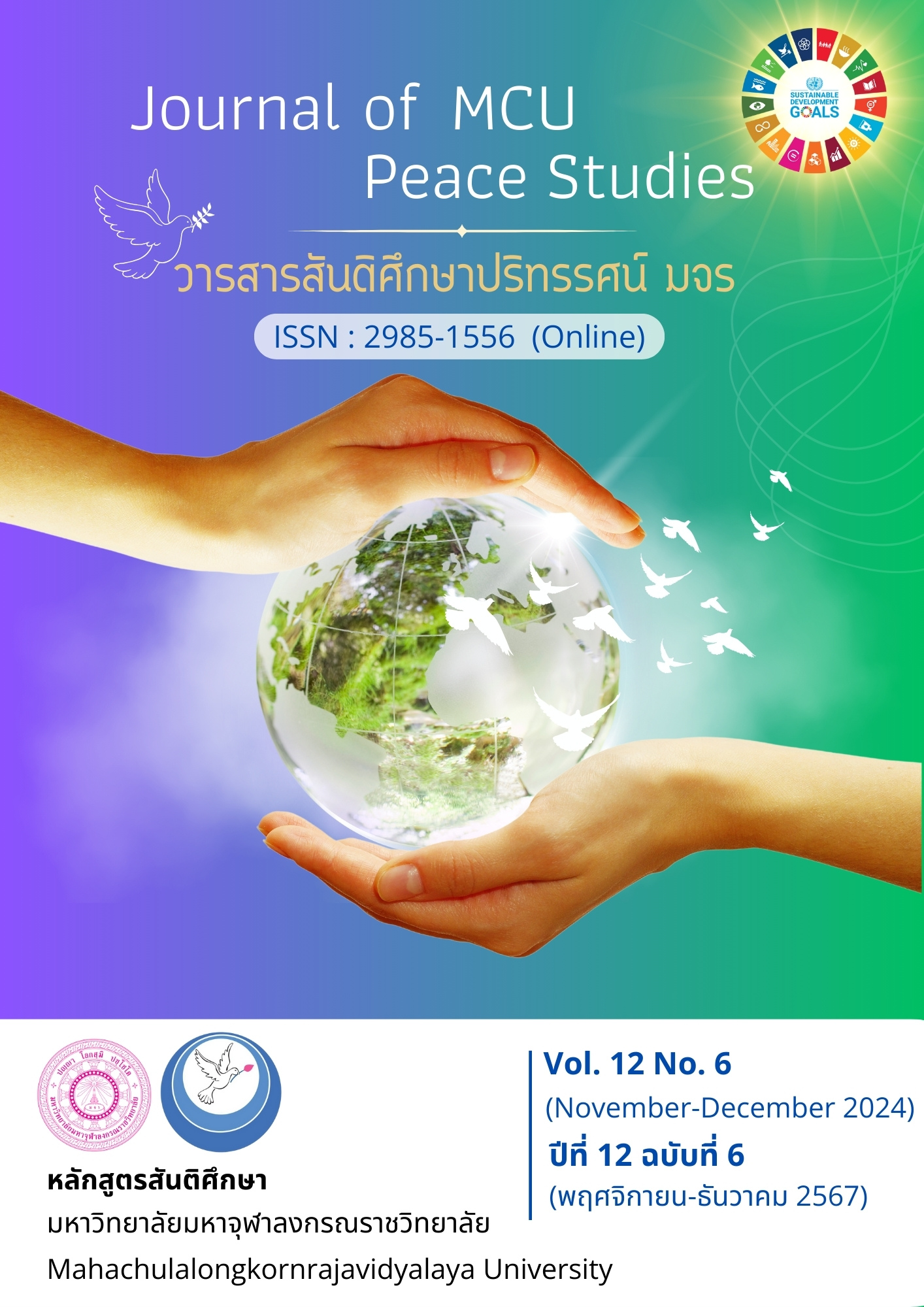การพัฒนาทักษะกระบวนการทางวิทยาศาสตร์และผลสัมฤทธิ์ทางการเรียนของนักเรียนชั้นประถมศึกษาปีที่ 6 หน่วย หิน วัฏจักรหิน และซากดึกดำบรรพ์ โดยการจัดการเรียนรู้แบบใช้ปัญหาเป็นฐานร่วมกับความคิดเป็นภาพ
Main Article Content
บทคัดย่อ
การวิจัยครั้งนี้มีความมุ่งหมายเพื่อ 1) สร้างแผนการจัดการเรียนรู้ หน่วย หิน วัฏจักรหิน และซากดึกดำบรรพ์ โดยการจัดการเรียนรู้แบบใช้ปัญหาเป็นฐานร่วมกับการคิดเป็นภาพ ให้มีประสิทธิภาพตามเกณฑ์ 80/80 2) เปรียบเทียบทักษะกระบวนการวิทยาศาสตร์ของนักเรียนก่อนเรียนและหลังเรียน 3) เปรียบเทียบผลสัมฤทธิ์ทางการเรียนของนักเรียนก่อนและหลังเรียน 4) ศึกษาความพึงพอใจของนักเรียนที่มีต่อการจัดการเรียนรู้แบบใช้ปัญหาเป็นฐานร่วมกับการคิดเป็นภาพ งานวิจัยในครั้งนี้เป็นงานวิจัยเชิงทดลอง กลุ่มตัวอย่างที่ใช้ในการวิจัย คือ นักเรียนชั้นประถมศึกษาปีที่ 6 จำนวน 20 คน ภาคเรียนที่ 1 ปีการศึกษา 2565 โรงเรียน บ้านตองโขบ โดยการสุ่มตัวอย่างแบบกลุ่ม เครื่องมือที่ใช้ในการวิจัย ได้แก่ 1) แผนการจัดการเรียนรู้แบบใช้ปัญหาเป็นฐานร่วมกับการคิดเป็นภาพ 2) แบบทดสอบวัดทักษะกระบวนการทางวิทยาศาสตร์ 3) แบบทดสอบวัดผลสัมฤทธิ์ทางการเรียน และ 4) แบบสอบถามความพึงพอใจ สถิติที่ใช้ในการวิเคราะห์ข้อมูล ได้แก่ ร้อยละ ค่าเฉลี่ย ส่วนเบี่ยงเบนมาตรฐาน และสถิติทดสอบค่าทีแบบกลุ่มที่ไม่เป็นอิสระต่อกัน
ผลการวิจัยพบว่า 1) แผนการจัดการเรียนรู้แบบใช้ปัญหาเป็นฐานร่วมกับการคิดเป็นภาพ ของนักเรียนชั้นประถมศึกษาปีที่ 6 มีประสิทธิภาพเท่ากับ 83.80/81.00 เป็นไปตามเกณฑ์ 80/80 ที่กำหนดไว้ 2) ทักษะกระบวนการทางวิทยาศาสตร์ของนักเรียนชั้นประถมศึกษาปีที่ 6 โดยการจัดการเรียนรู้แบบใช้ปัญหาเป็นฐานร่วมกับการคิดเป็นภาพหลังเรียนสูงกว่าก่อนเรียนอย่างมีนัยสำคัญทางสถิติที่ระดับ .01 3) ผลสัมฤทธิ์ทางการเรียน โดยการจัดการเรียนรู้แบบใช้ปัญหาเป็นฐานร่วมกับการคิดเป็นภาพ หลังเรียนสูงกว่าก่อนเรียน อย่างมีนัยสำคัญทางสถิติที่ระดับ .01 และ 4) ความพึงพอใจของนักเรียนที่มีต่อการจัดการเรียนรู้แบบใช้ปัญหาเป็นฐานร่วมกับการคิดเป็นภาพ อยู่ในระดับมาก ( = 4.48)
Article Details

อนุญาตภายใต้เงื่อนไข Creative Commons Attribution-NonCommercial-NoDerivatives 4.0 International License.
ทัศนะและความคิดเห็นที่ปรากฏในบทความในวารสาร ถือเป็นความรับผิดชอบของผู้เขียนบทความนั้น และไม่ถือเป็นทัศนะและความรับผิดชอบของกองบรรณาธิการ ยินยอมว่าบทความเป็นลิขสิทธิ์ของวารสาร
เอกสารอ้างอิง
Biewchan, J., & Chumsukon, M. (2022). A Study of Moral Reasoning by Concept Attainment Model with Visual Thinking Technique in S15101 Social Studies of Grade 5 Students at Ban Ka Pee School. Rajabhat Maha Sarakham University Journal, 16(3), 171-183.
Jaitam, J. (2021). The Development of Science Teaching Process using the 7-Step Learning Cycle (7E) in Combination with Practical Teaching Method on the Necessary Nutrients for Plant Growth to Promote Scientific Thinking and Creative Problem-Solving Skills of
Matthayomsuksa 5 Students. Sisaket Rajabhat University Journal, 15(2), 81-94.
Kongkachart, C., & Niyom, S. (2018). The Effects of Learning Management by Using 4 MAT on Achievement and Attitude towards Mathematics of Matthayomsuksa 1 Students. Journal of Graduate Studies in Northern Rajabhat Universities, 8(15), 123-136.
McMillan, J. H., & Schumacher, S. (1997). Research in Education. New York: Longman.
Na Nongkhai, L., & Keawkiriya, T. (2016). A Development of the Learning Method of Problem-Based Learning with Cooperative Learning on Cloud Computing by Google Apps. Romphruek Journal, 34(3), 11-34.
National Institute of Educational Testing Service. (2020). Educational Test Report Basic National Level (O-NET), Prathomsuksa 6, Academic Year 2020. Retrieved December 20, 2023, from http://www.newonetresult.niets.or.th/AnnouncementWeb/PDF/SummaryONETP6_2563.pdf
Racho, P., Wongchalee, P., & Pansuppawat, T. (2022). Development of Science Process Skills and Learning Achievement of Prathomsuksa 6 Students on the Topic of My Body by Using Project Based Learning and Philosophy of Sufficiency Economy. Rajabhat Maha Sarakham University Journal, 16(2), 77-88.
Saphuksri, S., & Uamcharoen, S. (2012). The Development of Emotional Intelligence and Critical Reading Skill of the Third Grade Students Taught by Problem-Based Learning. Silpakorn Educational Research Journal, 4(2), 177-190.
Silaporn, T. (2020). The Effect of SSCS Learning Management on Mathematical Problem-Solving Ability and Learning Achievement of the Fourth Secondary School Students. Social Sciences Research and Academic Journal, 15(1), 89-102.
Sontiluk, P., Pansuppawat, T., & Khamhaengpol, A. (2023). Development of Science Process Skills of Mathayomsuksa 4 Students on the Topic of Linear Motion Using Student Teams Achievement Division Technique Combined with Concept Mapping. Journal of Graduate School Sakon Nakhon Rajabhat University, 20(88), 10-18.
Srisawat, S. (2022). Development of Learning Management Model to Promote Thai for Communicative Skills by the Task-Based Learning Approach for Undergraduate Students. Social Sciences Research and Academic Journal, 17(3), 97-112.
Sutanan, P. (2022). The Development of Learning Activity Using Visual Thinking Process to Enhance English Listening and Speaking Skills of Mathayom 2 Students. Journal of Organizational Innovation & Culture, 13(2), 98-112.
Waichompu, N., Plianbumroong, D., & Nawsuwan, K. (2019). Active Learning: Problem-Based Learning in the 21st Century. Journal of Yala Rajabhat University, 14(1), 149-159.


